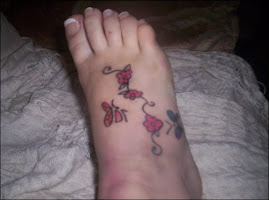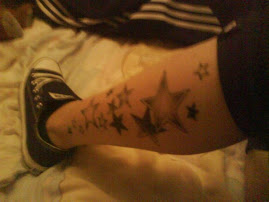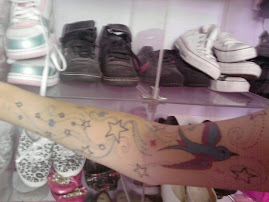Tattooing the foot is a bad idea for several reasons not the least of which is hygienic. Obviously the feet are the lowest part of the body and are submitted to the most uncleanliness. For this reason extra care must be taken to insure the foot tattoo remains clean while at the same time is not overly covered as a new tattoo must be exposed to the air. So while keeping the tattoo clean you must also not have the foot covered by a sock or bandage for several days while the new tattoo is healing. Also a skilled tattoo artist is required for the foot as there is not a lot of room to rest the hands and the artist will have to take extra care with the designs detail
Tattoos on the neck often heal looking bad with unclear lines and colors that look smudgy. There are many reasons for this some of them resting in the fact that the skin of the neck is some of the worst on the body for tattooing. Ideal skin for tattooing is tight and firm while neck skin is often flabby and hard to stretch. Colors tend to look cloudy on the neck a skilled tattoo artist will be able to implement techniques to limit the smudgy colors, but the neck will never delivery the color clarity that other body parts will
Tattooing the rib cage may be the single most painful part of the body. The area is fine for the artist there is plenty of room to wrest the wrist while tattooing and the skin is all ready stretch out due to how the customer must lie to receive the tattoo. The problem with rib cage is there is not a lot of skin tissue between the outer skin and the actual rib cage which results in blown out lines. That is lines that are thick and often cloudy along the edges,this is common with rib cage tattoos even among skilled professionals
Please Visit My Website
Lower Back Designs
Heart Back Designs
Article Source: http://EzineArticles.com/?expert=Bobby_Alexander
Showing posts with label Tattoos. Show all posts
Showing posts with label Tattoos. Show all posts
Sunday, 24 January 2010
Saturday, 23 January 2010
Tattoo After Care
So, you need to know about tattoo after care because you are ready to get a new tattoo!
It may be your first time, or it may be your tenth time, but in every case, you should review your tattoo after care instructions prior to getting your new tattoo. You might wonder about the logic about looking at the instructions before getting your new tattoo, but it is like baking a cake, you just don't want to make any mistakes with these instructions because new tattoos are open wounds and susceptible to infection.
You must be attentive to your new tattoo, and keep it as clean as possible to ensure that it heals as cleanly as possible so you prevent infection and end up with the nicest looking tattoo possible.
While the healing stages of a tattoo will be as unique to each individual as there are people in this world, the tattoo healing process does follow a general pattern. The specifics of each tattoo's healing process will depend on the different skin type of the individual, the location of the tattoo on the body, an the techniques of the tattoo artist. These factors can all cause a variance in the healing process from individual to individual.
You will be given aftercare instructions by your tattoo artist. These aftercare instructions differ from artist to artist. My recommendation to you is if in doubt about anything, always go back to your tattoo artist before seeking the help of a doctor. Your tattoo artist can take a look at your tattoo and tell what to do if their is a problem to correct any healing problems.
If your tattoo artist cannot help, they should send you for medical attention from a doctor. If they do not, then of course, you must go yourself to make certain that your health is not at risk. This is your responsibility.
Many times doctors don't know much about tattoos and will prescribe unnecessary medications that may harm your tattoo's healing process. Some doctors may even be biased against tattoos. That is why I suggest that you go to the tattoo artist first if you suspect their is a healing problem with your new tattoo. The artist works with tattoos day in and day out and is familiar with the best way to heal their work.
When you leave the tattoo studio, you will have a bandage on your new tattoo to protect it from outside contact. This bandage should be removed 2- 3 hours after getting your tattoo. Your tattoo may bleed a little for the first 24 hours, remember, your new tattoo is akin to an open wound.
Before you remove your bandage, make sure to wash your hands with soap and warm water, in between the fingers, and under the fingernails. Then dry your hands with a clean paper towel. Do not use any old towel that is laying there, or even a clean towel as lint may be transferred to your hands.
Make sure you have not let a large amount of blood dry on your bandage so that it sticks. Be very, very gentle as you remove your bandage so as not to start the tattoo bleeding again. If you just rip off your bandage, you can mess up the appearance of your new tattoo, and you don't want to do that, now do you?
Wash your tattoo gently, very gently with anti-bacterial soap and water to clean it. Do not scrub your tattoo, do not use a washcloth, or anything else other than your fingers or hand to clean the tattoo. Do not rub, but "pat" the tattoo as you wash it. Then, when you are finished, pat the tattoo dry with a clean dry paper towel. Or, use clean toilet paper even, if you don't have any paper towels on hand.
Let your tattoo air dry for 15 minutes or so. This will promote healing.
After your tattoo has dried, apply a few drops of Emu Oil to your tattoo. The presence of essential fatty acids along with the hyper-oxygenation of Emu Oil naturally increases the circulation to the applied area which is why Emu Oil works so well and so quickly to heal.
Even though it is an oil, it has been proved that Emu Oil does not clog pores (unlike most commercially made tattoo aftercare products that are petroleum based), therefore allowing the skin to breathe during the healing process. Emu Oil penetrates through all seven layers of the skin and is rich in nutrients (essential fatty acids) that feed the skin to aid in new cell development that can hasten the healing process. Emu Oil is also a natural emollient keeping the skin moist and pliable.
The application of the Emu Oil immediately after the tattoo has been cleaned will also relieve the discomfort and reduce the inflammation and redness of the new tattoo. Emu Oil will help set the new colors due to its deep penetrating properties and will help reduce plasma oozing.
Using Emu Oil 2-3 times a day after repeating the cleaning process while the tattoo heals will keep the area moist reducing or eliminating the flaking or scabbing that often occurs as new tattoos heal. Emu Oil can prevent the need for touch ups which saves the artist time and money, and makes for a happy tattoo customer.
New tattoos will look red and swollen immediately following the tattoo procedure. The tattoo will continue to appear this way for a few days throughout the tattoo healing process. Within a week to ten days the skin surrounding the tattoo should be more back to normal - most tattoos are completely healed in three weeks time.
While it is healing it is important not to do the following things or you may damage your tattoo:
- Do Not scratch your new tattoo
- Do Not pick at your new tattoo
- Do Not expose your tattoo to sunlight or tanning beds under any circumstances
- No swimming, hot tubs or baths the first two weeks after getting your new tattoo
- Do Not shave the tattooed area for at least 30 days following the tattoo procedure
- Only touch your tattoo with clean hands, do not let others touch your tattoo
Not only is Emu Oil good for healing new tattoos, it is good for restoring older, aged, sun damaged tattoos as well. This is due to the natural hyper-oxygenation of Emu Oil which brings blood and oxygen to the surface of the skin. This, coupled with Emu Oil's ability to moisturize through all seven layers of the skin, allows users to see quick results when the oil is applied to older tattoos.
With the proper care of your tattoo from the start, there is no reason why you shouldn't enjoy the beauty of your tattoo for a lifetime.
Julie Chrisler writes articles on a wide variety of topics. She has been fascinated by tattoos for some number of years now after her 27 year old daughter started getting tattoos years when she was 16 and has grown to love them. Coupled with her love of tattoos is her fascination with Emu Oil, the "wonder oil from down under", which has helped her with her daily pain from Osteoarthrithis, among many other marvelous uses she has discovered for this wonder oil. Visit http://hubpages.com/hub/Tattoo-After-Care for more detailed information on Tattoo After Care.
Article Source: http://EzineArticles.com/?expert=Julie_Chrisler
It may be your first time, or it may be your tenth time, but in every case, you should review your tattoo after care instructions prior to getting your new tattoo. You might wonder about the logic about looking at the instructions before getting your new tattoo, but it is like baking a cake, you just don't want to make any mistakes with these instructions because new tattoos are open wounds and susceptible to infection.
You must be attentive to your new tattoo, and keep it as clean as possible to ensure that it heals as cleanly as possible so you prevent infection and end up with the nicest looking tattoo possible.
While the healing stages of a tattoo will be as unique to each individual as there are people in this world, the tattoo healing process does follow a general pattern. The specifics of each tattoo's healing process will depend on the different skin type of the individual, the location of the tattoo on the body, an the techniques of the tattoo artist. These factors can all cause a variance in the healing process from individual to individual.
You will be given aftercare instructions by your tattoo artist. These aftercare instructions differ from artist to artist. My recommendation to you is if in doubt about anything, always go back to your tattoo artist before seeking the help of a doctor. Your tattoo artist can take a look at your tattoo and tell what to do if their is a problem to correct any healing problems.
If your tattoo artist cannot help, they should send you for medical attention from a doctor. If they do not, then of course, you must go yourself to make certain that your health is not at risk. This is your responsibility.
Many times doctors don't know much about tattoos and will prescribe unnecessary medications that may harm your tattoo's healing process. Some doctors may even be biased against tattoos. That is why I suggest that you go to the tattoo artist first if you suspect their is a healing problem with your new tattoo. The artist works with tattoos day in and day out and is familiar with the best way to heal their work.
When you leave the tattoo studio, you will have a bandage on your new tattoo to protect it from outside contact. This bandage should be removed 2- 3 hours after getting your tattoo. Your tattoo may bleed a little for the first 24 hours, remember, your new tattoo is akin to an open wound.
Before you remove your bandage, make sure to wash your hands with soap and warm water, in between the fingers, and under the fingernails. Then dry your hands with a clean paper towel. Do not use any old towel that is laying there, or even a clean towel as lint may be transferred to your hands.
Make sure you have not let a large amount of blood dry on your bandage so that it sticks. Be very, very gentle as you remove your bandage so as not to start the tattoo bleeding again. If you just rip off your bandage, you can mess up the appearance of your new tattoo, and you don't want to do that, now do you?
Wash your tattoo gently, very gently with anti-bacterial soap and water to clean it. Do not scrub your tattoo, do not use a washcloth, or anything else other than your fingers or hand to clean the tattoo. Do not rub, but "pat" the tattoo as you wash it. Then, when you are finished, pat the tattoo dry with a clean dry paper towel. Or, use clean toilet paper even, if you don't have any paper towels on hand.
Let your tattoo air dry for 15 minutes or so. This will promote healing.
After your tattoo has dried, apply a few drops of Emu Oil to your tattoo. The presence of essential fatty acids along with the hyper-oxygenation of Emu Oil naturally increases the circulation to the applied area which is why Emu Oil works so well and so quickly to heal.
Even though it is an oil, it has been proved that Emu Oil does not clog pores (unlike most commercially made tattoo aftercare products that are petroleum based), therefore allowing the skin to breathe during the healing process. Emu Oil penetrates through all seven layers of the skin and is rich in nutrients (essential fatty acids) that feed the skin to aid in new cell development that can hasten the healing process. Emu Oil is also a natural emollient keeping the skin moist and pliable.
The application of the Emu Oil immediately after the tattoo has been cleaned will also relieve the discomfort and reduce the inflammation and redness of the new tattoo. Emu Oil will help set the new colors due to its deep penetrating properties and will help reduce plasma oozing.
Using Emu Oil 2-3 times a day after repeating the cleaning process while the tattoo heals will keep the area moist reducing or eliminating the flaking or scabbing that often occurs as new tattoos heal. Emu Oil can prevent the need for touch ups which saves the artist time and money, and makes for a happy tattoo customer.
New tattoos will look red and swollen immediately following the tattoo procedure. The tattoo will continue to appear this way for a few days throughout the tattoo healing process. Within a week to ten days the skin surrounding the tattoo should be more back to normal - most tattoos are completely healed in three weeks time.
While it is healing it is important not to do the following things or you may damage your tattoo:
- Do Not scratch your new tattoo
- Do Not pick at your new tattoo
- Do Not expose your tattoo to sunlight or tanning beds under any circumstances
- No swimming, hot tubs or baths the first two weeks after getting your new tattoo
- Do Not shave the tattooed area for at least 30 days following the tattoo procedure
- Only touch your tattoo with clean hands, do not let others touch your tattoo
Not only is Emu Oil good for healing new tattoos, it is good for restoring older, aged, sun damaged tattoos as well. This is due to the natural hyper-oxygenation of Emu Oil which brings blood and oxygen to the surface of the skin. This, coupled with Emu Oil's ability to moisturize through all seven layers of the skin, allows users to see quick results when the oil is applied to older tattoos.
With the proper care of your tattoo from the start, there is no reason why you shouldn't enjoy the beauty of your tattoo for a lifetime.
Julie Chrisler writes articles on a wide variety of topics. She has been fascinated by tattoos for some number of years now after her 27 year old daughter started getting tattoos years when she was 16 and has grown to love them. Coupled with her love of tattoos is her fascination with Emu Oil, the "wonder oil from down under", which has helped her with her daily pain from Osteoarthrithis, among many other marvelous uses she has discovered for this wonder oil. Visit http://hubpages.com/hub/Tattoo-After-Care for more detailed information on Tattoo After Care.
Article Source: http://EzineArticles.com/?expert=Julie_Chrisler
Want a Tattoo?
Before taking the step to have a permanent tattoo affixed to your body, you must first do some thorough thinking. Take into consideration that any tattoo will be with you for the rest of your life and is VERY expensive and painful to remove. Choose the location of the tattoo on your body very carefully. It may be a good idea to wear a non-permanent tattoo for a while to make sure that the tattoo you're getting is exactly the right size and design you want.
Tattoos are reasonably painful to get, but you may stop the tattooist at any time during the procedure, until you feel ready to go on again. Some people feel pain more acutely than others. Most people feel inclined to get another tattoo soon - which is an indication of the bear ability of the pain. Large tattoos are done over a period of time, to give the wearer time to rest after each session. And yes, when the tattooist perforates the skin, there will be moderate bleeding. It is a good idea to be well rested before your first tattoo!
http://www.cybertattoos.cyberbuzz.co.za/
http://EzineArticles.com/?expert=Renee_C_Meyer
Tattoos are reasonably painful to get, but you may stop the tattooist at any time during the procedure, until you feel ready to go on again. Some people feel pain more acutely than others. Most people feel inclined to get another tattoo soon - which is an indication of the bear ability of the pain. Large tattoos are done over a period of time, to give the wearer time to rest after each session. And yes, when the tattooist perforates the skin, there will be moderate bleeding. It is a good idea to be well rested before your first tattoo!
http://www.cybertattoos.cyberbuzz.co.za/
http://EzineArticles.com/?expert=Renee_C_Meyer
Subscribe to:
Posts (Atom)





